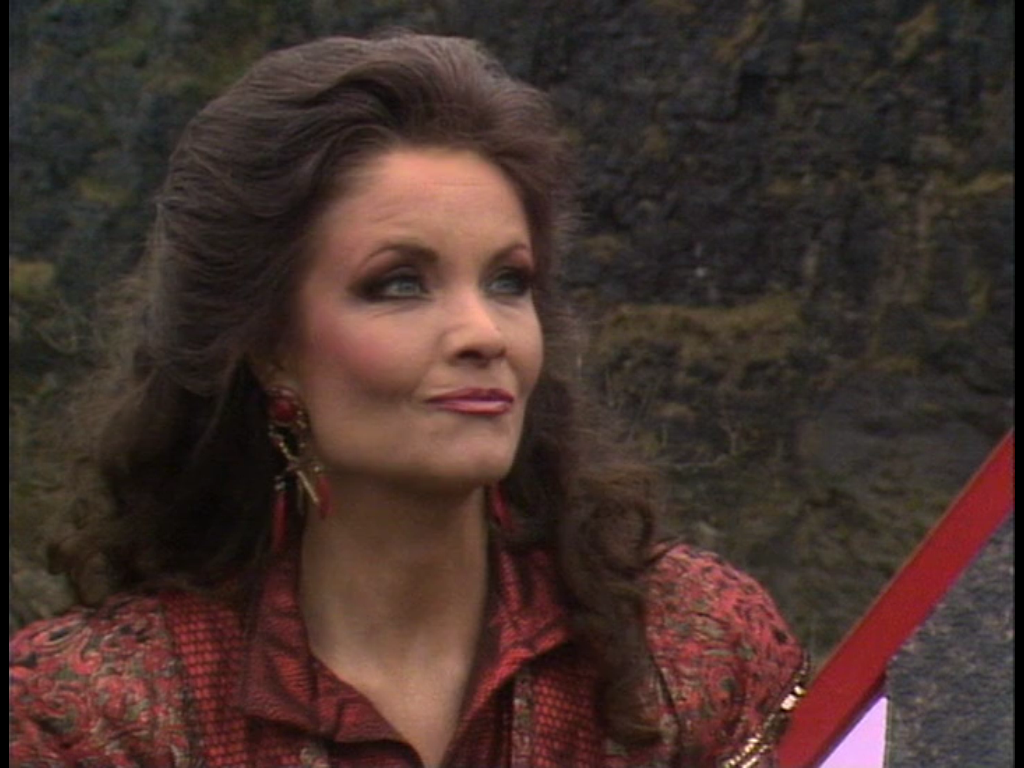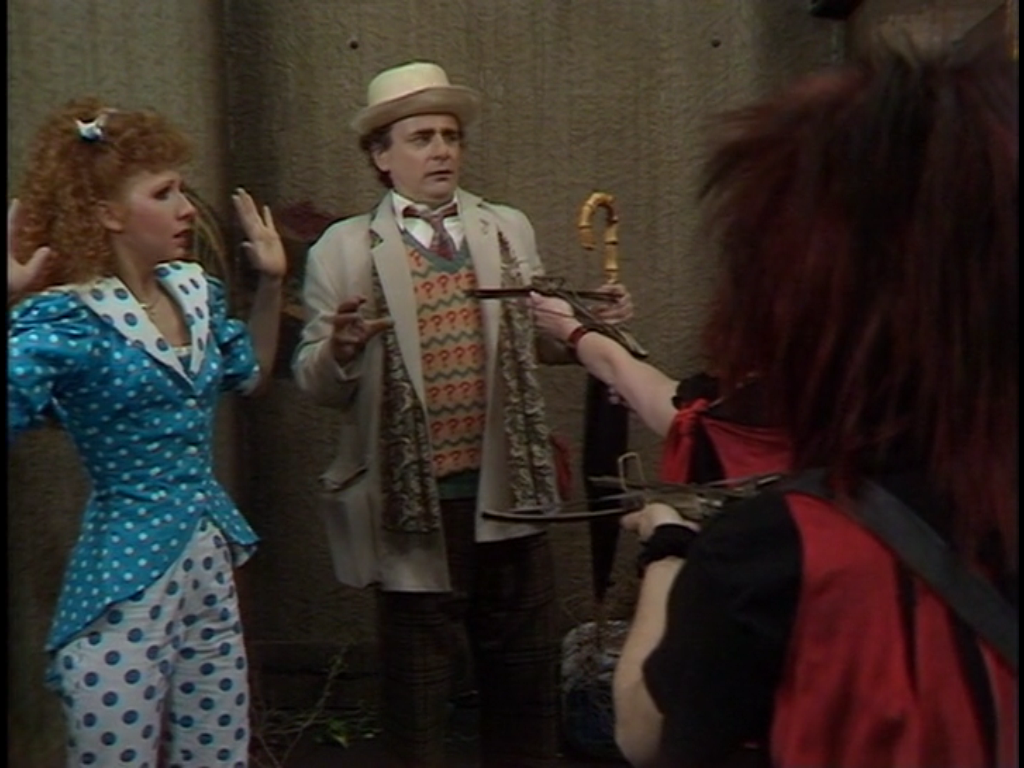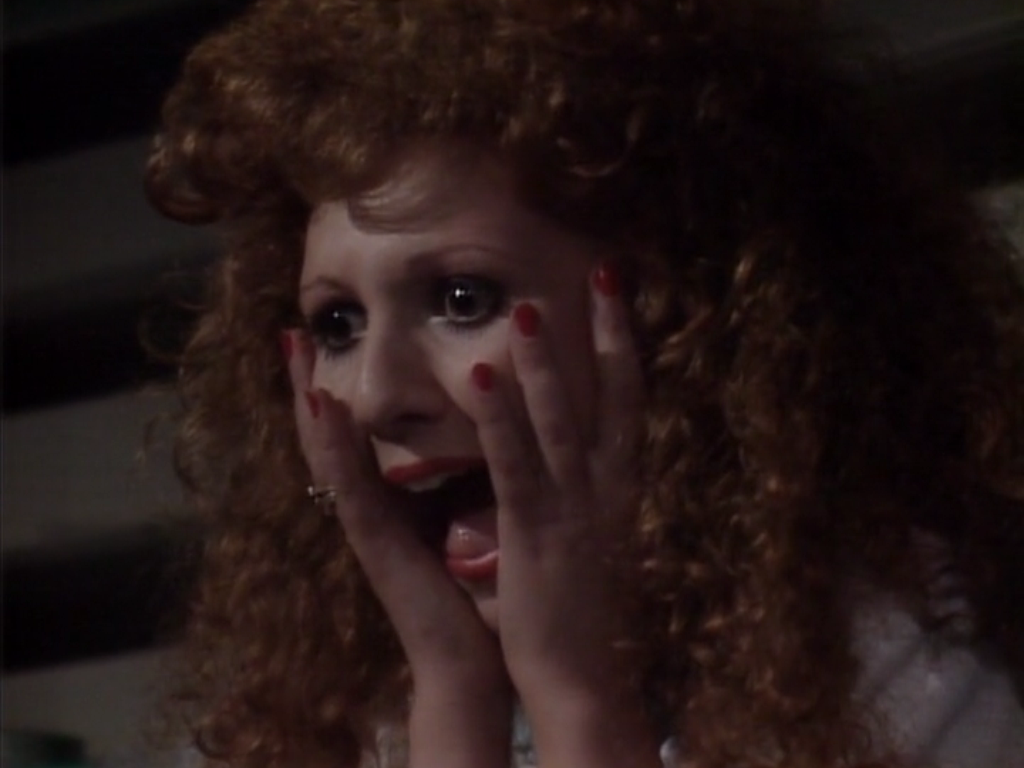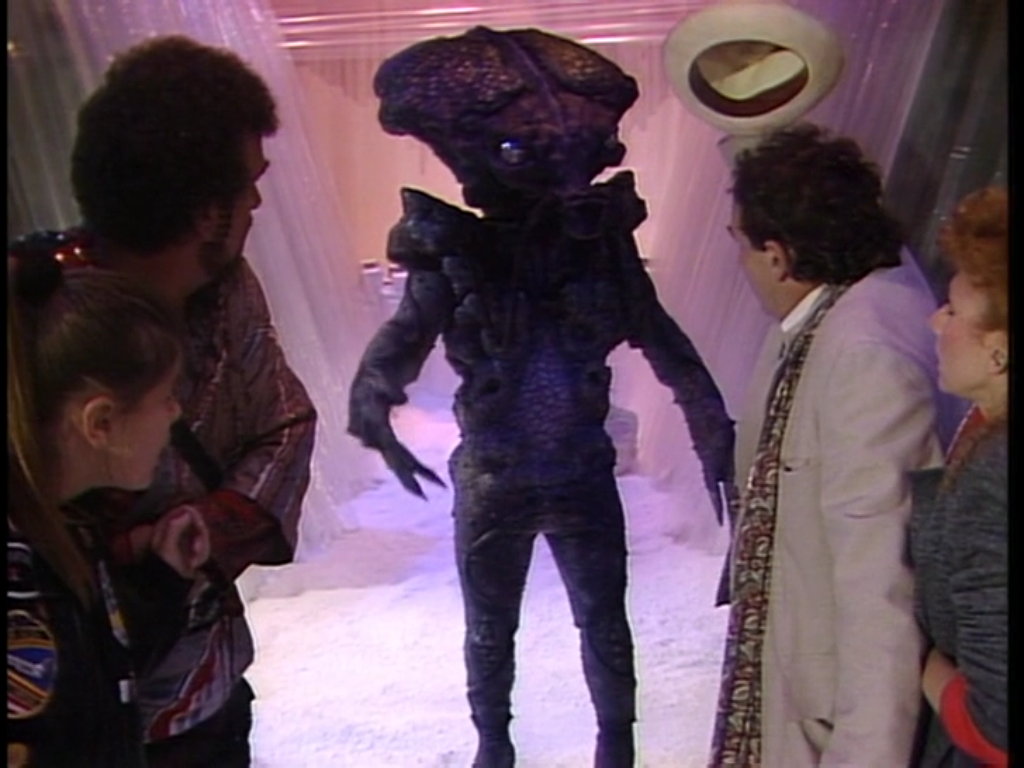We’re back! At a glance, it might look like I skipped a month. But that’s both true and not, as you’ll see below…
The 7th Doctor was played by Sylvester McCoy, who came on board during an extremely troubled time for the show behind the scenes. It had already been cancelled then un-cancelled while Colin Baker was starring as the 6th Doctor, and while the show survived, Baker was fired in-between seasons. While Baker was eventually offered the opportunity to come back for one more story to bring his time to a close, he turned it down and we ended up with no real transition from one to the next (save for a pre-credits sequence involving new actor McCoy wearing Baker’s outfit and a big curly blond wig, only seen from behind).
More importantly, not only was Baker gone, but script editor Eric Saward had also left the series. In the earlier days of Doctor Who, it was the script editor (rather than the producer) who did the bulk of commissioning the scripts for the show, and by the time new script editor Andrew Cartmel was hired he ended up inheriting the first two scripts because everything was so far behind schedule. The end result was McCoy’s first season consisting of four stories where one had been written for Baker, and the remaining three for a “generic Doctor” because no one at the time knew what this new Doctor’s personality would be like.
McCoy had the role for three years, with a total of twelve stories, before the show was cancelled once more. This time it stuck. McCoy did return seven years later, though, to appear in the Doctor Who television movie starring Paul McGann. With that in mind, I thought it might be fun to merge McCoy and McGann’s months into a big two-month-long viewing extravaganza (especially since McGann only had that one outing), and to watch all thirteen stories.
What I didn’t count on was work getting even busier, plus losing a lot of free time due to starting graduate school. So with still two stories waiting to be watched, I’m going to use this entry to tackle the first four stories (or first season) starring McCoy; a second and possibly third post will hopefully come soon with McCoy’s remaining stories as well as McGann’s solo outing. And with that in mind…
Ask a Doctor Who fan which of McCoy’s episodes was the worst, and three out of four will tell you that it’s “Time and the Rani.” Sometimes fan lore leads you down a path of opinions that are based on hearsay rather than actual viewing. This is not one of those times.
“Time and the Rani” admittedly has a huge disadvantage; it wasn’t written for McCoy’s Doctor at all, and while writers Pip and Jane Baker and script editor Andrew Cartmel clearly tried to file off the edges of the previous Doctor once Colin Baker’s return was officially nixed, but it’s still trying to push a square peg into a round hole. The Doctor here is often snappish and rude, only to then veer off into pratfalls and slapstick. It’s a bungled mess right from the start.
Then you add in a nonsensical plot (one that relies far too heavily on sheer laziness of the main villain), some truly awful acting, and another rock quarry that’s standing in for an alien planet. At the end of the previous season, new companion Melanie had been introduced as played by Bonnie Langford, but aside from being energetic she was a complete non-entity, and that unfortunately carries through into this season where it’s quickly clear that no one is interested in writing for Mel. Langford gets a lot of flack for her time on Doctor Who, but I feel that’s not fair. She’s clearly very professional and does whatever the scripts and director tell her to do, but at the same time she’s also been placed into a show where no one is interested in her sticking around.
There are two great things about “Time and the Rani,” to be fair. The first is whenever returning guest actress Kate O’Mara’s character of the Rani disguises herself as Mel. Her fake chirpy-sweet voice mixed with genuine disdain and loathing for the Doctor is nothing short of hysterical, and her ever-building annoyance with everyone around her is a real treat in those first two episodes. Sadly once she pulls off the wig and stops pretending to be Mel, she’s straight out of an episode of Dynasty, complete with shoulder pads, lipstick, and a big glamorous hairdo. So much for the hard-working scientist who doesn’t want to take over the world; in “Time and the Rani” her goal is ultimately to take over the universe and rework it as she sees fit.
The other great thing is how director Andrew Morgan has the Lakyrtians run. This may sound strange, but you need to take my word on this. They’re supposed to be slightly lizard-like, and when they run, Morgan has them hold their arms back at an angle. It actually makes them look like a species of small lizard, and while some do it better than others (Karen Clegg as Sarn in particular) it’s at least an attempt to make them a little difference.
Otherwise? I have nothing good to say about this, perhaps save that if you drink a lot it gets funnier and funnier. But it’s bad. It’s really bad. Shockingly, appallingly bad. (Not as bad as “The Twin Dilemma,” which still edges this story out as “worst first story for a new Doctor,” but this is the nadir of the McCoy era, right out of the gate.)
There’s nowhere to go but up after “Time and the Rani” and this story is one that’s fun but ultimately let down by a few small pieces. It’s a sharp satire, set in an abandoned and enclosed high-rise where the three groups of people (the elder ladies known as “rezzies,” the young adult girls formed into three groups of gangs called the “Kangs,” and the all-male caretakers) are at odds with one another, even as a force in the basement is sending cleaning robots out to kill everyone once and for all.
This is a dark comedy, one where characters get dragged through waste-disposal chutes, cannibals feast on the fellow residents, and there’s a strange sort of LGBT subtext to the three different groups. It’s also one of the only stories that’s established its own sort of slang and words, where there’s a genuine new society that’s formed here, and which has quietly plotted out its own history. Writer Steven Wyatt was a real find, and if you operate solely off of the script for “Paradise Towers” it’s a real winner. This story was my favorite of the season when I first saw it back in 1987, and that still holds true. McCoy’s Doctor is still generic, but there’s a little bit of his scheming nature that would eventually come to the forefront that shows up here, with a touch of oddball to boot. It’s a huge, huge step forward from the previous story.
That said… there are three problems with “Paradise Towers,” one that’s not that noticeable and two that are. The smallest of the three is that Wyatt clearly has no idea what to do with the character of Mel. She wanders around and gets kidnapped a lot, and while Wyatt uses her to let us see some more of the Towers (most notably the deadly rezzies), this is a story where if you’d removed her from the story entirely almost nothing would change. She spends all of episode three trapped in a lift, that’s how unessential she is. But ultimately, this is a problem you can ignore.
The two bigger problems are more in your face. First, you never really get the sense that “Paradise Towers” isn’t being filmed on a soundstage. This is a story where the setting needs to be more decayed, more full of garbage and broken machines, more desolate. The script is clearly pointing them in this direction, but it never quite gets there; it makes places like Tilda & Tabby’s immaculate home or the roof-top pool not quite the contrast to the rest of the Towers that they should be, and that’s a shame. And second is actor Richard Briers, who in episode four plays his character like a mentally-challenged zombie. Seriously. It’s impossible to ignore, and it’s mortifying. I challenge you to watch that episode and not have anyone who walks into the room randomly during one of those performances to not start laughing and or shaking their head. It’s just awful.
All in all, though, “Paradise Towers” is well worth your while. It’s a wonderfully dark satire and for his first dip into the show, Wyatt already is hitting the mark.
There were only two McCoy episodes that I’d only watched once, prior to this year’s little experiment. One of them you’ll see in the next blog post, but the other was “Delta and the Bannermen.” This is a story that I remembered as being problematic, as it veered wildly between a light, fluffy story (Aliens pretending to be tourists! 1950s rock-n-roll! Bumbling FBI agents!) and a dark, nasty story (Genocide! Mass-murdering innocent bystanders! Supporting characters getting shot in the back as they flee!). As it turns out, it’s actually worse than I remembered.
Ignoring everything that I mentioned up there, “Delta and the Bannermen” just looks cheap. Filmed entirely on location, director Chris Clough clearly has no idea what to do with what this story required. The holiday camp in Wales is supposed to be a bit run down, sure, but everything about this story looks like it was put together on a budget of whatever spare change they could find under the sofa cushions. It’s poorly lit, it’s unconvincing, and it’s servicing a crap script with more extraneous characters and idiotic turns than you can imagine. This is a story where the Doctor and company randomly drive around on a motorcycle for huge stretches of time, so far as you can tell for the sole reason of stalling so they’ll fill out their 25-minute run time for the episode. Last but not least, add in a Doctor who apparently hates Earth and humans, doesn’t know what an apple is, and is generally not quite like anything we’ll ever see before or after this show, and “Delta and the Bannermen” is a disaster. The best thing it has going for it is that it’s only three episodes and not four. In fact, let’s just move directly on to…
“Dragonfire” closes out the season, and by this point we’re starting to get a better grasp of what the remaining two seasons with McCoy will be like. It’s not a perfect script (although like Wyatt earlier in the season, writer Ian Briggs does well enough to come back for a second stab) but it’s genuinely fun and entertaining. It’s mostly remembered for the departure of Langford from the series, as Mel is written out and new companion Ace takes her place.
Played by Sophie Aldred, Ace is now a little cringe-worthy in places. It’s a teenager as written by people who have never met a teenager, with far too much cries of various slang words and a strange sort of veering back and forth between someone who’s younger and then older than she should really be. But here’s the thing: the character works. She’s one of the very few companions who grows and matures over her time on board the TARDIS, and for whom it’s difficult to swap out for another generic companion. She’s forceful, she takes matters into her own hands a lot, she makes explosives and blows things up. There are a handful of companions before Ace that are similar in scope, but in her nine stories Ace goes through a pretty huge shift, and I feel that script editor Cartmel does an excellent job of guiding the character through that transformation. Had there been one more season, Ace was due to leave after two more stories (and complete the character’s journey), and even without them you can see that they’d plotted out a beginning, middle, and end for the character. These days that’s not so innovative, but at the time it was impressive.
Anyway, “Dragonfire” is fun. The villain of Kane is chilling (and I’m not talking about his icy touch), and his defeat and death isn’t quite like anything else we’d had on the show to date. It’s a little slight in places, but moments like Patricia Quinn’s character of Belazs talking about her regrets in joining Kane, or the “take the coin” moment with Ace when Kane tries to recruit her are genuinely excellent. It’s a good way to close out the season, having established a blueprint of what’s to come.




RT @gregmce: Blog Post: 50 Years of Doctor Who: Sylvester McCoy (part 1) http://t.co/EYcKOMz7Nd
@gregmce Ooh, watched Dragonfire & Paradise Towers for 1st time this weekend. Timely! Can’t wait to see what you say about Happiness Patrol.
@gregmce As you might guess, I enjoyed that post. 🙂
@trinalin @gregmce Eewww. 😉 *runs*
You are a librarian already. See, I plan to delve these archived posts for when we are ready to really attack the past episodes in earnest. Thank you for your service to humankind!
@gregmce finally read it. Top stuff.
[…] Picking up where I left off last time… part 2 of Sylvester McCoy’s run on the series, spanning all of Season 25 and the first […]